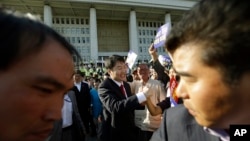South Korean lawmakers have voted to allow the arrest of a colleague accused of conspiring to stage a rebellion in support of North Korea.
Seoul's National Assembly overwhelmingly voted Wednesday to waive the parliamentary immunity of Representative Lee Seok-ki of the Unified Progressive Party, a minor, leftist party that holds six of 298 seats in parliament.
The National Intelligence Service has accused Lee of leading a May meeting in which the UPP allegedly plotted to attack a national communications center and other infrastructure in case of a war with North Korea.
Before the vote, Lee called the charges a "medieval witch hunt" against him.
"The National Intelligence Service (NIS) has accused me of a horrible allegation - conspiracy of rebellion - and has conducted a medieval witch hunt by mobilizing the conservative press. Regardless of whether the accusation against me is true, an agenda to agree on my arrest is irrationally and barbarically proceeding at the national assembly."
The UPP says the accusations were made up by the NIS in order to distract the public from allegations that the spy agency attempted to rig last year's presidential election.
The NIS last week raided homes and offices belonging to UPP officials, arresting three of its members. Lee's arrest required parliamentary approval because lawmakers enjoy immunity while parliament is in session.
It is not clear if a district court will issue an arrest warrant for Lee.
The former student activist also faced subversion charges in 2002, before receiving a presidential pardon.
North and South Korea remain in a technical state of war since the 1953 agreement that ended hostilities between them was only a truce.
Tensions between Seoul and Pyongyang flared earlier this year after North Korea's latest nuclear test. At the height of the crisis, North Korea was threatening nuclear war against its southern neighbor and the United States.
Seoul's National Assembly overwhelmingly voted Wednesday to waive the parliamentary immunity of Representative Lee Seok-ki of the Unified Progressive Party, a minor, leftist party that holds six of 298 seats in parliament.
The National Intelligence Service has accused Lee of leading a May meeting in which the UPP allegedly plotted to attack a national communications center and other infrastructure in case of a war with North Korea.
Before the vote, Lee called the charges a "medieval witch hunt" against him.
"The National Intelligence Service (NIS) has accused me of a horrible allegation - conspiracy of rebellion - and has conducted a medieval witch hunt by mobilizing the conservative press. Regardless of whether the accusation against me is true, an agenda to agree on my arrest is irrationally and barbarically proceeding at the national assembly."
The UPP says the accusations were made up by the NIS in order to distract the public from allegations that the spy agency attempted to rig last year's presidential election.
The NIS last week raided homes and offices belonging to UPP officials, arresting three of its members. Lee's arrest required parliamentary approval because lawmakers enjoy immunity while parliament is in session.
It is not clear if a district court will issue an arrest warrant for Lee.
The former student activist also faced subversion charges in 2002, before receiving a presidential pardon.
North and South Korea remain in a technical state of war since the 1953 agreement that ended hostilities between them was only a truce.
Tensions between Seoul and Pyongyang flared earlier this year after North Korea's latest nuclear test. At the height of the crisis, North Korea was threatening nuclear war against its southern neighbor and the United States.





